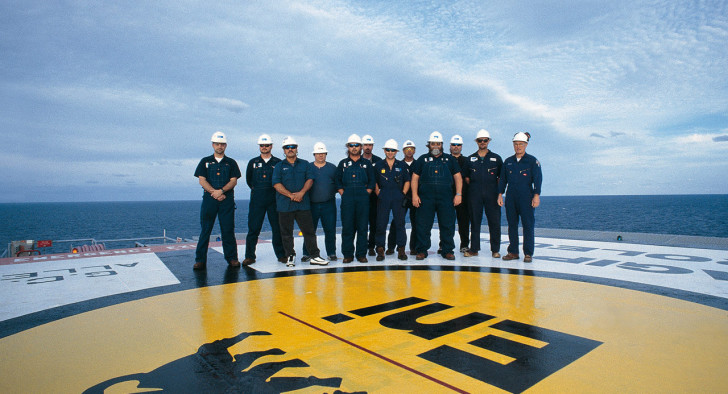
ENI’s Gas Discovery in Egypt Puts Pressure on Italian-Russian Energy Ties
Publication: Eurasia Daily Monitor Volume: 12 Issue: 166
By:

The discovery of a world-class supergiant gas field in the waters off Egypt’s Mediterranean coast by Italian state-owned energy producer ENI is another step forward in Italy’s attempt to become an energy hub in southern Europe. Despite the silence of both the Russian government and the Kremlin-controlled oil and gas companies, ENI’s astonishing natural gas find could further dent Italian-Russian energy relations, which have seen moments of tension since the breakout of the Ukrainian conflict early in 2014.
On August 30, ENI claimed to have detected a natural gas deposit at the Zohr Prospect, in Egypt’s offshore Shorouk Block (Eni.it, August 30). ENI has full rights to operate the site, which has reserves estimated at 850 billion cubic meters (bcm). Egypt’s massive gas field is considered much more profitable for the Italian company than the Mamba-Prosperidade gas complex in Mozambique and the Kashagan oil field in Kazakhstan, where ENI also holds relevant stakes. Zohr should come on stream in three years, due to the fact that it first needs important infrastructure investments to be fully exploited.
ENI CEO Claudio Descalzi points out that Italy could import part of this field’s natural gas that Egypt will not use for its domestic needs. Excess production from the Zohr Prospect could, indeed, be treated at ENI’s liquefied natural gas (LNG) facility in Damietta, near Egypt’s Mediterranean city of Port Said, and then shipped to Italy (Askanews.it, August 31).
In this prospect, the Zohr gas deposit will strengthen Italy in its quest to find new energy suppliers, so as to limit its main dependence on Russia, Libya and Algeria. It is worth remembering that the diversification of fossil fuel providers is a key element of the common energy market envisaged by the European Union.
The natural gas find at the Zohr Prospect will satisfy Egypt’s own domestic natural gas demand for at least a decade. This will impact negatively on the Russian energy business, taking into account that Russia’s state-owned natural gas monopoly Gazprom is providing Cairo with LNG under a five-year agreement signed in March. Additionally, in late August, another Russian firm, Rosneft, concluded an LNG supply accord with the Egyptian Natural Gas Holding Company (RT, March 18; Rosneft.com, August 27). On August 31, Hamdi Abdelaziz, the spokesperson for the Egyptian Ministry of Petroleum and Mineral Resources, underlined that the discovery would not prejudice Egypt’s pending or projected contracts with Russian oil and gas companies. However, just one day before, he had stressed that his country would suspend all natural gas imports for three to five years (Sputnik News, August 31).
With its growing boldness in oil and gas exploration activities, notably in North and East Africa and in the Mediterranean basin, ENI is contributing to reducing Russia’s market share in the region’s natural resources sector. This could lead to further friction between ENI and Gazprom, two long-standing industrial partners whose relations have been strained over the past months, reflecting Euro-Russian tensions about the Kremlin’s involvement in the Ukrainian crisis. In fact, ENI has lost important business opportunities related to two Gazprom-led initiatives to transport Russian gas from the Black Sea coast to Europe by circumventing Ukraine: the South Stream pipeline venture and the alternative project of Turkish Stream.
In December 2014, Russian President Vladimir Putin scrapped the South Stream project, in which ENI had a 20 percent share. Then, in late July 2015, Gazprom cancelled a contract with Saipem—an ENI subsidiary company—for the construction of the first segment of Turkish Stream (see EDM, July 10).
Also fueling tensions between Italy and Russia is the allegation that Gazprom is breaking EU antitrust rules. Namely, the European Commission accuses Gazprom of charging higher prices in countries that are more dependent on Russian gas. Gazprom’s discriminatory policy for gas prices in Europe also affects Italy, which buys natural gas from Russia at a higher cost than Germany, a trade and manufacturing rival of Italy’s within the European bloc (Repubblica.it, May 11).
On August 20, after a meeting with ENI’s Descalzi, Gazprom head Alexei Miller tried to ease strains with the Italian partner, contending that the Russian energy giant is eager to involve Saipem in new projects (TASS, August 20). Yet, looking at the current situation, with South Stream’s demise and Turkish Stream’s stall, it is hard to imagine Saipem’s participation in any Gazprom-run initiatives in the foreseeable future. For instance, at this moment, there are no signs of Italian involvement in the expansion of the Nord Stream gas pipeline (also known as Nord Stream Two), another major Russian venture that connects Vyborg in Russia with Greifswald in Germany, running under the Baltic Sea (TASS, September 4; see EDM, September 10, 14, 15).
However, the real problem for Moscow’s energy policy toward Italy is Rome’s ambition to carve out a role as a hub to redirect natural gas to northern Europe from the Mediterranean and the Caucasus (Lettera43.it, September 1). Italy is expected to become a transit country to channel gas from North Africa (Libya, Algeria and, in the foreseeable future, Egypt) and the Levant (Israel and Cyprus). Italy’s southern border is also projected to be the entry point of gas piped to Europe from Azerbaijan through the EU-championed Southern Gas Corridor (SGC) project. The SGC is a planned system of pipelines (currently under construction) to bring natural gas from the Azerbaijani gas field of Shah Deniz to southern Italy via Georgia, Turkey, Greece and Albania, and could be potentially extended to pipe Iranian and Turkmenistani gas.
In the natural gas scheme envisioned by Italy to turn itself into a strategic energy player, Russia’s state-controlled oil and gas companies are cut out—at least, for the time being. This perspective is a double challenge to Russian energy interests. New flows of natural gas coming from the Eastern Mediterranean Sea and the Caspian Sea will further push downward fossil fuel prices and offer European countries a potential antidote to Moscow’s well-worn policy of using its oil and gas reserves as political leverage or a geopolitical weapon.
Russia is still gripped by a harsh economic crisis and Gazprom is keen to maintain close ties with a solid Western counterpart such as ENI, even though the Italian energy company is becoming a serious competitor to the now embattled Russian energy giant. And all this is happening as the EU mulls renewing economic and financial restrictions against Russia for backing Moscow’s proxy forces (operating jointly with regular Russian military units) in southeastern Ukraine. Nevertheless, in the end, the Kremlin continues to look to Rome as a possible (hidden) ally to end the sanctions regime imposed on Russia by the EU.




